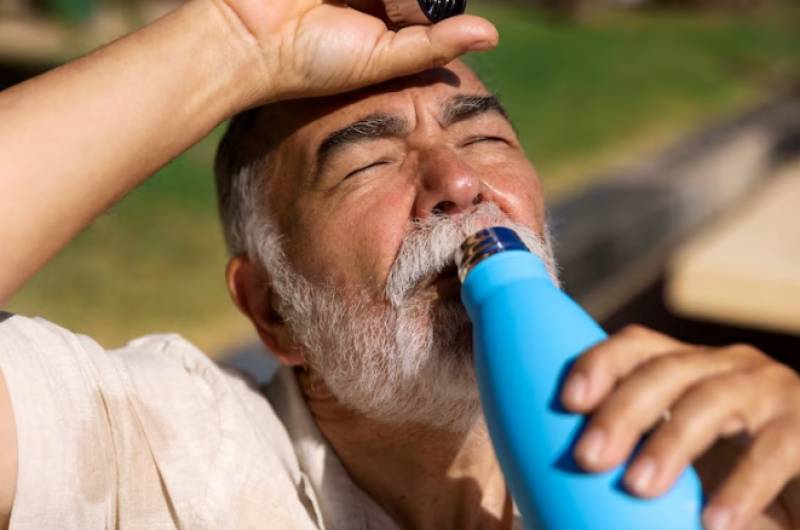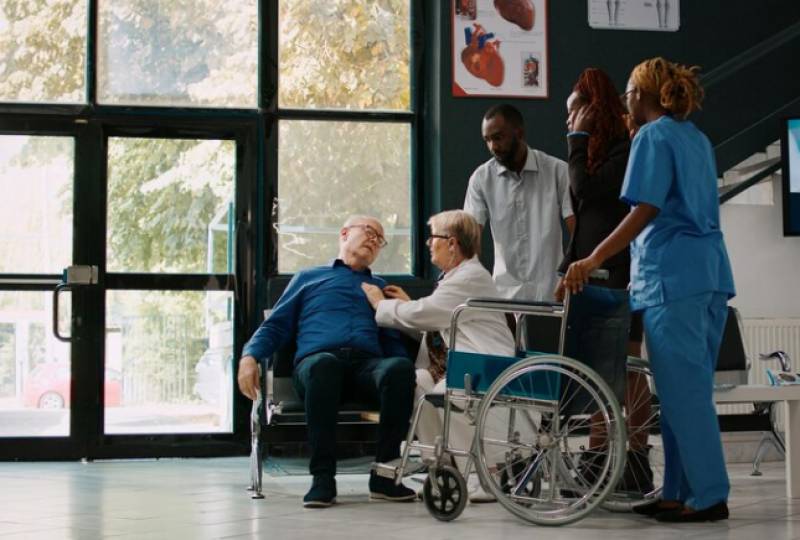- Region
- Vega baja
- Marina Alta
- Marina Baixa
- Alicante
- Baix Vinalopo
- Alto & Mitja Vinalopo
-
ALL TOWNS
- ALICANTE TOWNS
- Albatera
- Alfaz Del Pi
- Alicante City
- Alcoy
- Almoradi
- Benitatxell
- Bigastro
- Benferri
- Benidorm
- Calosa de Segura
- Calpe
- Catral
- Costa Blanca
- Cox
- Daya Vieja
- Denia
- Elche
- Elda
- Granja de Rocamora
- Guardamar del Segura
- Jacarilla
- Los Montesinos
- Orihuela
- Pedreguer
- Pilar de Horadada
- Playa Flamenca
- Quesada
- Rafal
- Redovan
- Rojales
- San Isidro
- Torrevieja
- Comunidad Valenciana
article_detail
Date Published: 12/07/2023
Protect yourself this summer by recognising the symptoms of heat stroke
In Spain, 70% of people who suffer from heat stroke will die as a result

According to the National Institute of Statistics, a total of 122 people died from heat stroke between the months of May and August 2022 and another 233 people from dehydration in Spain.
The country is experiencing worse heatwaves with each passing year, which come earlier and are more intense all the time. While most people will suffer to some degree in this heat, succumbing to heatstroke can often prove deadly.
During the summer months, hospital admissions generally rise by between 7% and 10%, explained Miriam Ruiz, the intensive care physician at the Sant Joan d'Alacant University Hospital, and a frightening 70% of people who get a heat stroke will die from it.
As always, prevention is better than cure, and understanding the signs and symptoms of heat stroke is key to protecting your health, and that of your loved ones, this summer.
The differences between heat stroke and sun stroke

The disorder caused by excess heat in the body, which usually occurs from prolonged exposure to high temperatures or from physical exertion in high temperatures, is known as heat stroke. It is the most serious form of heat injury and can occur if the body temperature reaches 40°C or higher.
Symptoms of heat stroke are usually quite severe and include loss of consciousness, muscle cramps, fainting and difficulty speaking. An ambulance should be called immediately and the patient kept cool while waiting for the emergency services. Paramedics will generally try to lower the body temperature with ice baths.
Sun stroke, on the other hand, is caused by prolonged exposure to the sun without adequate protection, when the body is unable to regulate its temperature and it rises to very high levels that can damage the organs.
It can be preceded by heat exhaustion, which occurs when the body loses too much fluid and salt through sweating, resulting in physical weakness. Symptoms of sun stroke include headache, profuse sweating, tiredness, sun burn, nausea, blurred vision and even loss of consciousness.
How to avoid heat stroke and sun stroke

- Stay out of the sun during the hottest parts of the day, generally between 1pm and 5pm, and avoid prolonged physical work or exercise outdoors.
- If you can’t avoid the sun altogether, always wear a high-factor sunblock and reapply regularly throughout the day and after swimming.
- Stick to well-ventilated, shady areas and wear light-coloured, loose clothing that covers your head and as much skin surface as possible.
- Eat light, regular meals that are rich in water and mineral salts, such as fruits and vegetables and drink plenty of water to stay hydrated.
Images: Freepik
staff.inc.ali
Loading
Sign up for the Spanish News Today Editors Roundup Weekly Bulletin and get an email with all the week’s news straight to your inbox
Special offer: Subscribe now for 25% off (36.95 euros for 48 Bulletins)
OR
you can sign up to our FREE weekly roundup!
Read some of our recent bulletins:
Discount Special Offer subscription:
36.95€ for 48 Editor’s Weekly News Roundup bulletins!
Please CLICK THE BUTTON to subscribe.
(List price 3 months 12 Bulletins)
Read more stories from around Spain:
Contact Murcia Today: Editorial 000 000 000 /
Office 000 000 000





















